#contemplating on life like a Greek philosopher when she sits like this
Text

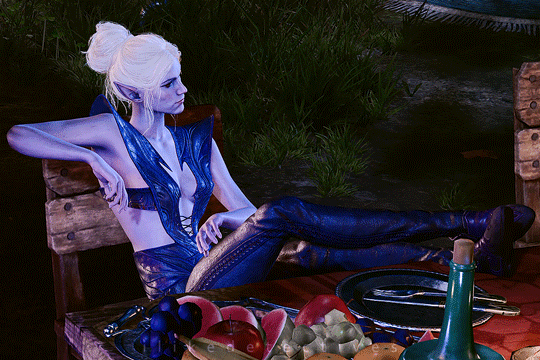
"Yes, my love? Are you done talking to your friends? Can we leave?"
#Minthara Baenre#Nightwarden Minthara#Baldur's Gate 3#bg3#gamingedit#video games#mine#mybg3edit#mybg3companion#mybg3minthara#mybg3gifs#mygif#I love that she has a short social battery just like me UwU#contemplating on life like a Greek philosopher when she sits like this
2K notes
·
View notes
Text
A Daydream In Defense of Classical Education: Love the Lord Your God With all Your Solid, Liquid, Gas, and Plasma

LentWatch 2020, Week One: Freedom!
Change is hard. Breaking habits is harder. And breaking habits without accountability is the hardest, which is probably why I've already "failed" at my personal Lent goals by snacking after dinner (c'mon, it was just a few cookies… and some meat-n-cheese… and some chips). But despite realizing my limits and having to drop that one goal, I've held strong to the rest (which you can read about by clicking here), and the results have been like a long sigh after months of holding my breath.
At first, I felt a little lost. Especially regarding social media and YouTube videos. It's amazing how we, in the 21st century, have lost the ability to sit idle. Every spare moment is taken up by checking our phones. Waiting at doctor's offices, going to the bathroom, five-second pauses in friendly conversation—they all fall victim to Instagram notifications, leaving no room for actual thought. And I almost forgot the joy of such idleness before I gave these little things up. And that, combined with cutting television down to a minimum and alcohol down to zero, has made way for that glorious thing that used to be so condemned by teachers and parents: daydreaming!

Now, one can't just cut out all entertainment cold turkey. I'm not even convinced that a human can survive on work and sleep alone. There must be some in-between where we recharge and enjoy pleasures of our own choosing. And so, instead of Facebook and Netflix and beers, I've been reading—at night, mostly, but also in the morning, and even a little during the day. As I said in my previous post, I started re-reading Celebration of Discipline. But I'm also reading The Book of Revelation, The Time Machine, and a creative young adult trilogy called The Illuminae Files. I've never been one to read multiple things at one time, but gosh, it seems like my mind has been hungry for too long, and now it's chowing down. And with the glut of all these stories and ideas, I'm finding that I pause every page or so to just think.
What am I thinking about? All kinds of stuff! For example, why water can't (typically) get hotter than 212 degrees Fahrenheit. Or why an open refrigerator will actually heat a room. Or whether Einstein was wrong about exceeding the speed of light. Or why four separate books of the Bible seem to disagree about how to love God (and thus, what it means to be human). You know, normal stuff.
WARNING: What follows is some serious musing and rambling. If you're strapped for time or are easily irritated by random details, skip to the last paragraph. You'll have no idea what the title of this post means, but hey, I'm not sure I really know, so…
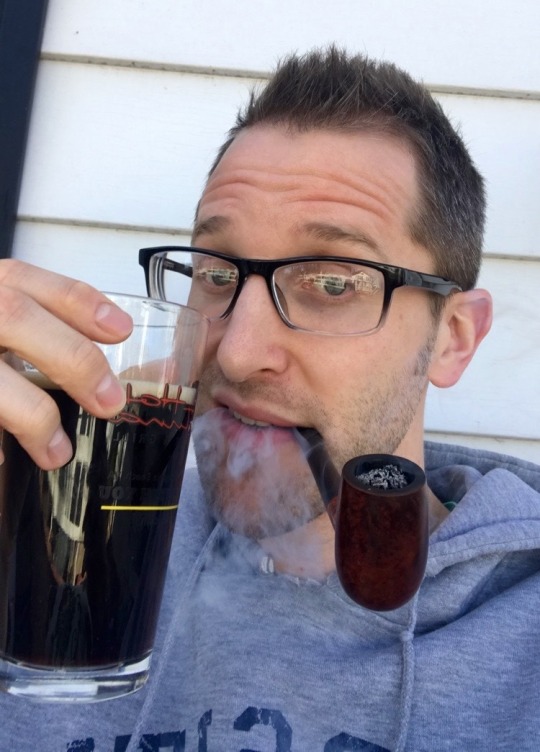
Now, if you haven't checked out, you're probably just intrigued enough to wonder if I've completely lost it. But it may surprise you to know that all of the thoughts I listed above are quite related. And I never would have had them (or their subsequent "higher" questions) if I hadn't "wasted" tens of thousands of dollars on a bunch of classes that I "didn't need" in college. I would have just read the books I listed earlier with interest, and then I would have moved on with my life. But, you see, there are things that bind us—things that connect us to art, literature, history, architecture, mathematics, science, religion, and back to art again. And, for me at least, the more I fill in the gaps between these elements of the human experience, the more I appreciate it all.
I get that not everyone is like me. I get that most people are happy to learn a craft—become an expert, even—work at that craft, leave a legacy, and catch the last episode of their favorite TV shows. And that's the way it's always been. I mean, not everyone in ancient Greece was a philosopher. Not everyone in the Middle Ages received a classical education. But there may have been soldiers and peasants who would have enjoyed the experience had they been given the opportunity. And I, for one, am one of those peasants.

As I've said in previous posts, my young life was characterized by impulsiveness, which culminate in the idea that, "I should go to college and become a physical therapist." I just kind of had the idea one day, so I did it. I resonate with Elle Woods (from Legally Blonde) when she applied to Harvard Law School and said, "What, like it's hard?" Now, of course college was hard (and PT school was much more so), but I enjoyed it. All of it. Even the classes that I didn't need to take: philosophy, freshman English (in which I learned only about Little Red Riding Hood in all of her iterations throughout history…), physics, Old Testament studies, American history. Learning to enjoy education was a slow burn, and it definitely didn't peak until college. If I'd have followed my first inclinations as a senior in high school, I would have joined the military or the police academy, and I would have had a fulfilling career in either (likely with a more impactful contribution to society), but I never would have understood the universe in the way that I do now. And that would have been a real shame.
But I did go to college, and I did rack up student loans (which I'm scheduled to pay off this spring!). And I did come close to what could be called a classical education, which laid the foundation for me to continue to learn, grow, and connect thoughts and ideas into new and creative concepts… some of which are kind of insane, like the one's I mentioned above, which I will now explain briefly (but only if you see the dragon in this picture I took below. Why? Because it’s awesome, and if you don’t see it, you’re not worthy--aka weird enough--to continue):

Thanks to the books I'm reading in tandem—along with plenty of breaks spent daydreaming in idle, wandering thought—I've dredged up an old fascination of mine: Why is the Great Commandment represented in four different ways in the Bible? "Love the LORD your God with all your heart and with all your soul and with all your strength." That's how the author of Deuteronomy puts it. But then when the verse is quoted by Jesus thousands of years later, Matthew, Mark, and Luke all put it in slightly different terms: "heart, soul, and mind," "heart, soul, mind, and strength," and "heart, soul, strength, and mind," respectively. Now, I realize the differences are subtle, and Mark and Luke both say the same things in a different order, but they are different. And when the essence of the phrase is, "Love God with everything you have," it's easy to wonder if these components make up everything it means to be human. And further research into the original languages in which these phrases were written sheds some light onto the discrepancy: English (and Greek, for that matter) doesn't have the words to describe the original Hebrew text, so slight variations are represented based on who's writing it and in what language.
But the intrigue remains. What does make up a human? And the answer, for someone like me (OCD, science-minded, Christian foundation), it's clear that we're bound together by a multifaceted system, like the Holy Trinity or the Four States of Matter. And so, if we take the States of Matter approach, what if our strength (bones, muscles, tendons) is akin to "solids," our heart (hormones, neurotransmitters, basic emotions) is akin to "liquids," our mind (cortical thought, short-term memories, self-awareness) is akin to "gas," and our soul (that ethereal, immortal morality not bound to social constructs or genetic influence) is akin to "plasma?" And so, such extrapolation (i.e. going down the Wikipedia rabbit hole) naturally leads to all sorts of allegory and thought puzzles. Oh, what fun it is to dream!

LAST PARAGRAPH BELOW FOR NORMAL PEOPLE:
Like I said, cutting the distractions from my day has allowed me to get back to the things that bring me true joy: quiet contemplation, purposeful living, and totally normal ideas about what it means to be human. Week one has been a success. I'm thankful for the money I "wasted" on my education because it's made me the man I am today, and I'm thankful for Lent because, even though I will inevitably fail at some of it, my ultimate victory will be remembering who I am as a man (which, apparently, boils down to the various states of matter…). So, thanks for reading, y'all. You could have been doing a bunch of other things (and you probably wish you had), but hopefully my rambling forced you to have at least one thought of your own.
And maybe, just maybe, that thought will lead to a daydream…

#lent#lent 2020#science and religion#science#states of matter#great commandment#daydream#daydreaming#free thinker#amreading#classical education#legally blonde#like it's hard
2 notes
·
View notes
Text
FRAGMENTS OF A STREET: Mitropoleos, Thessaloniki

The street Mitropoleos is situated in the second row to the sea. Walking one street in Thessaloniki (most of them run parallel to the sea) is like following one line of thought, one argument. Mitropoleos is just in between two of the arterial roads of the city, Leoforos Nikis and Tsimiski. Now, still following that logic, those two arguments are drawn rather ostentatiously. The former, eased by the sea’s breeze, with its cafés and bars carelessly looking out into the pretty sight that is the Mediterranean Sea. The latter, flooding countless cars from one side of the city to the other, and countless consumers from one franchise store to the next. However, walking on Mitropoleos is like reading between those broad lines of the argument that describe the city. And isn’t it here, between the lines, where true character is to be found?

If you walk here and you get the timing just right, you might find an unexpected companion: the municipal garbage disposal. Its route leads all the way over Mitropoleos, and while I’m wandering the street contemplatively, next to me, the bin men rummage their way through the waste of this street. In this city, even a dirty business like this one shouldn’t be seen as merely the civilised fulfilment of a functional purpose. No, in Thessaloniki the bin men are aestheticised into litter whisperers: “Many stories, one heart”, claims the logo on the tarnished lorry. Between the rubbish they hear the city’s truth voicing itself. And I listened: Strolling on, following their lead through the unsorted waste.
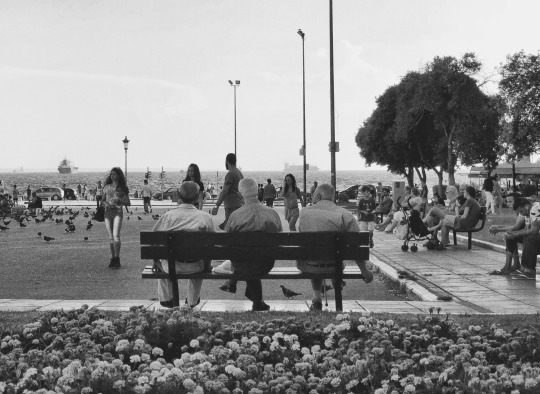
You know that cliché of the old mediterranean men sitting on benches letting life pass in front of them? It’s true, on Mitropoleos, for example. One of them might be talking of the time when they were classmates and they stole the candy from their teacher, the other one might be bragging about the time when he was a captain and he had a mistress in each port, and the last one might not even pay attention because he’s bored of the same old stories. Whatever they might be doing on this bench, the city gives them a space to do so. In Thessaloniki, you’ll always find the time and space to stop and take a break from the directedness of our everyday lives. You step aside, you sit down, stagnating. Most of the times, then you get up and you still have no idea, as it probably is the case with those three philosophers. But sometimes, out of this purposeless daydreaming, you get up and you’ve understood it all. There is another old Greek man who liked to sit down and contemplate, and they even honoured him with a symbolic statue, caught in the act, sitting, of course, here on Aristotle Square.
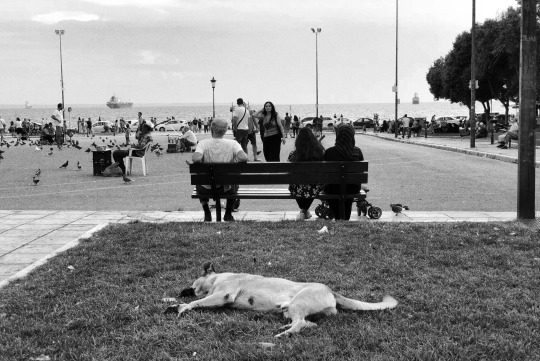
The stray dogs, on the contrary, don’t need these readymade spaces to do whatever they’re doing. One reason might be that, unlike those old gentlemen and their philosophical soulmate dogs are just not the types for contemplating around very much, I guess. Especially, on Mitropoleos you should keep your eyes open. Because you might trip over a stray dog who has spontaneously decided to take a nap right in the middle of a pedestrian street. They only give a shit about the artificial rationalisation of public space, when they actually take a shit. That makes their life a whole lot easier. Take this dog for example. He’s just lying around aimlessly, relieving himself from all the intentionality of his daily dog life, consuming his present to the ultimate. Maybe he’s the Flaneur in his most primitive form. Having to wander around, sometimes confused, sometimes enlightened from what I perceive underway, always in between me and the other, I admire him for his strict absolutism. But that he will never know.

Walking on, I spot a mythological goddess living on the first floor of brutalist apartment block: Marilyn Monroe is alive and she lives on Mitropoleos! Greek Marilyn might also seem like an exploited, even further extrapolated caricature of its original idea, torn into pieces in this brutal process of cultural predation. But something seems different about the way Greeks turn such real-life figures into larger-than-life icons. Maybe it’s their historical and philosophical entrenchment in ancient myths, a mytho-logic, that explains reality on the grounds of transcendent idols. They don’t allow their idols to be corrupted by the cynicism of self-awareness and self-criticism, those deadly interpretative means that killed American Marilyn. Instead, they look for the purity in her, and they extract those pure ideals that need to be worshipped and kept alive. Maybe, that is why, in the end, Greek Marilyn survives. What stays from her, here on Mitropoleos, shielded from the burning sun, is simply the beauty of her white face and the sensuality of her larger-than-life red lips.

Thessaloniki really is obsessed with beauty. And one way to pronounce that, Thessalonikians know very well, is with fashion. Unlike on the high street, Tsimiski, you won’t find the usual suspects on Mitropoleos when it comes to fashion. The stores here usually know what they’re doing, being specialised on a certain kind of wear or a certain target group. And it is this boutique culture that is representative for the stylistic attitude of the whole city. But just like Mitropoleos itself, fashionability between genders seems to be a one-way street. In comparison to the finesse of the female fashion, it is clearly visible that the male sections are on the last level of every store here. Still, everybody pays a great deal of attention to looks: Men on the women’s and women on their own. Even the mannequins in the windows can’t help but being real Thessalonikian women – offering their naked necks to be bitten by the beautiful devil of pleasure.
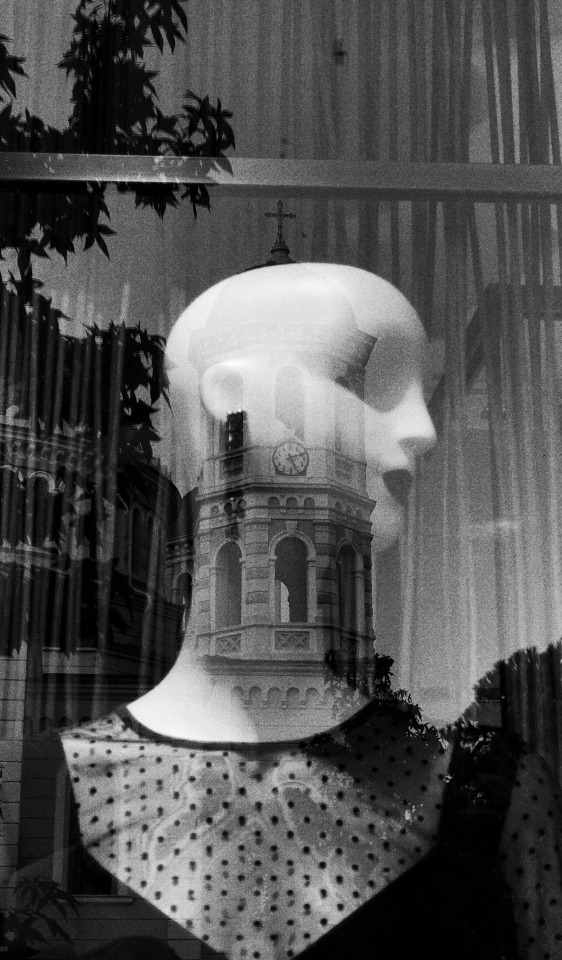
But there’s a limit to this diabolic seduction. The orthodox church, until today, has a firm grip on Greek society. You don’t always see it in them at first sight, especially in Thessaloniki, where cafés, bars, clubs and music halls constantly tempt you to dare a sexy fling with the devil. But if you look closely, it’s there, somewhere in the back of their minds. Even if people lustfully immerse themselves in mundane and secularised pleasures, the sinful conscience is always there. Their cultural décolleté certainly is inviting and pleasant to look at, but it’s covered with the seemingly pious transparent of decency. Maybe that’s what makes Thessaloniki so sexy.

That’s what I was talking about. Look at those men, for instance, sitting in a row, like the judges of the popular Greek TV show Greece’s Next Top Model, waiting for the next candidate to present her beauty on the catwalk in front of them. But this is a less sexist establishment than it seems. Everybody coming here knows they have just entered the stage, and this goes for all genders. Especially here, in the picturesque area by the port it’s all about seeing and being seen. The young and beautiful come to cafés like Appallou to meet their friends for a traditional freddo cappuccino, to talk about nothing or everything. And by selecting places like this one to update each other on the newest gossip, you multiply your exposure many times over. It’s almost like Instagram in real life: Use the right hashtag and location – and you become more likeable.

The walk along Mitropoleos concludes on the other end of the city center, with a truly iconic Thessalonikian view. It’s the White Tower, a former fortification against foreign invaders. Today the White Tower works quite the opposite way: Invading tourists are welcomed into the museum that is now inside the White Tower. For the Thessalonians themselves the White Tower is not particularly an object of such interest. The connection to it is more emotional, for historic reasons perhaps: It acquired its name in 1912, when Thessaloniki was finally annexed from the Ottoman Empire. And as a symbol of this purification, they whitewashed the facade. If you ask me, they just did it because it makes for a better view in the background, while you’re slurping your iced coffee with pleasure, here, in the soft sun on Mitropoleos.
3 notes
·
View notes
Photo
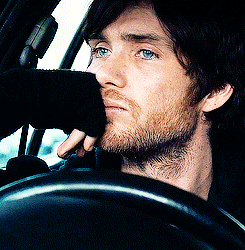

Name: Harper Viktor M. Quinn
Meaning of Name: Harper: “Whaler” “Harp player”, Viktor: conqueror, M....: Wouldn’t you like to know?, Quinn: counsel,
Nickname(s): Viktor
Age: 36
Birthday: June 14
Species/Nationality: Human, Irish
Accent: Yes
Language spoken: English,
Powers:
None
Weaknesses/Illness/Allergies: Has asthma, Has a form of CVS, Allergic to chocolate, Experiences panic attacks, Easily sunburnt,
Pet: Burmilla Cat (Yami, Male)
Occupation: Astrologer-Sociologist-Author - Philosopher
Faceclaim: Cillian Murphy
Description: Has shoulder length messy (soft) black hair, that is often tied up in a way that keeps most of his hair off his neck and shoulders. His eyes are a piercing cold blue, that often will appear to hold no emotion in them. He has freckles over the bridge of nose and a couple over his lips, as well as few other spots. There are three scars over his jawline, on the right side of his face. His skin is a very pale color, his shoulders also have a considerable amount of freckled patches over them that becomes spotty the farther down his back and arms you go. He has a lean, yet somewhat strong body type. He seems more the assassin type, rather than the warrior type of body. Has a tattoo he keeps hidden.
Outfit/Accessories/Jewelry: Glasses,
Height: 5’ 7-9"
Weight: 129
Body Build: Fit
Backstory/Background:
Past
Born to in Ireland to Irish parents, Harper grew up in an over protective home. His father, a theatre actor, insisted on his refining his artistic talents as he grew up. Teaching him not only how to also act, but how to play an instrument here and there, though not very well. He also tried to teach Harper how to use his imagination, despite the other being more than cold and detached most of the time. But over time, the young boy began to tap more into that side of himself.
His mother on the other hand, a therapist, continued on nurturing his thinker aspects. Which were a lot easier for the young boy to tap into. This bitter sweet combination between both his parents help to morph him into the person he would later become. As a child he wasn't very healthy, which made both his parents very protective of him. Though as he got older his health improved a bit. When he graduated from high school he moved to America to attend college. He has been attending college ever since, between work.
Present
Once in collage he soon met who would later be his future wife, Eleanor. The pair from the beginning seemed to get along very well for the most part. Eleanor did her damnedest to secure Harper in her clutches. Harper however, aware, didn’t mind it so much. Thinking that, in the beginning, it was a bit of harmless fun when it came to the way Eleanor behaved. However the behavior grew to become more and more dangerous.
With one day leading him to being taken to the hospital after a poisoning incident. They were due to be married a few months after this incident. With her cunning she believed she had duped Harper into forgiving her for the ‘little accident’. So the marriage remained on schedule. Soon the date had arrived and the pair were bonded. Though the excitement of nearly killing her once to be husband seemed to dull.
This prompted Eleanor over the next few years to again poison her husband, or otherwise make him ill so that she would be there to take care of him and bring him back to good health. This seemed to thrill her almost more than their own sex life had. Harper, still, tried his best to ignore it. But at times he was unable and would often let out a few frustrated comments to friends about his wife not being the person she pretended to be behind closed doors. But he would hardly ever elaborate on his comments.
Future
(Work In Progress)
Personality:
Adaptable, Aware, Brave, Calm, Committed, Honest, Angry, Cold, Gloomy, Dangerous, Adventurous, Inconsiderate, Creator, Loner, Anxiety, Blunt, Bold, Complex, Finicky, Cultured, Impressive, Hard, Impious, Clever, Indifferent, Liar, Masochist, Pessimist, Rebellious, Forecful, Remorseless, Contemplative, Unpredictable, Imaginative, Leisurely, Objective, Persuasive, Capable, Withdrawn,
Quirks/Savvies/Other: Believes in aliens, Has overly protective parents, Is a bullet magnet ( Mostly because of comments about Cillian always getting Shot/dying, lol), Can't swim, Can't start his day without checking his horoscope first, Is a heavy sleeper, Fidgeter, Meditates, Blogs, Plays musical instrument, Writes novels, Almost always eating some sort of candy (That isn’t chocolate), House is “organised chaos”, Always stands with feet apart, Shreds random pieces of paper/napkins when able to when bored, Bites lip when thinking, Is extremely flexible, Has a distinct accent, Can solve a Rubiks cube in under a minute, Good at hair braiding, Knows a lot of useless trivia, Always drumming on things, Absently bounces leg while sitting, Licks lips constantly, Constantly tapping fingers or feet, Likes to twiddle hair sometimes (When nervous or deep in thought.), Always has a book under arm or in pocket, Always wears something black/white/gray or purple/blue/green, Left Handed, A Cat Person, Blood Type AB,
Likes: Books, Puzzles, Fantasy, Board Games, Video Games, Horseback Riding, Astrology, Chess, Space, Fencing, Medieval history, Baking, Sailing, Bridge, Listening to music, Old sailing ships, Griffins, Pottery, Web design, Hamsters, Crystals, Ancient Greece, Wizards,
Dislikes: Constant Smokers, Drunks, techno music, clowns, Swimming, Mice, Seashells, Hiking, Ants, Opera, Comic books,
Fears: Tonitrophobia, Aichmophobia,
Personality Tests: Choleric, The Investigator, The Enthusiast, Crown/Third Eye/Navel Chakra, Neutral Good, ENTJ, Ravenclaw, Horned Serpent, Divergent, Oak - The Stabilizer, Wren, Soul Type: Thinker, Artisan, Slytherclaw, Horned Serpent/ Pukwudgie, Firebender, Team Mystic Member,
Other: Gemini,
Parent(s):
-> Father: Skylar Quinn
-> Mother: Irene Quinn
Siblings: None
Wife: Eleanor
Children: None, yet
Starters
Chat’s
Para’s
Face
Stuff
Information
Asks
All
Alternate Universes
Storm Coast AU
Greek God AU (Chaos)
Hunger Games AU
Pokemon AU
Zodiac AU
Harry Potter AU
Planet AU
Divergent AU
Jekyll and Mr Hyde AU
Norse God AU (Aegir)
Marvel AU
IT AU
Serial Killer AU
Dia Kester
AUs
7 notes
·
View notes
Text
The Big Questions – One – What is the Composition of the Universe?
The following is an excerpt from GigaOm publisher Byron Reese’s new book, The Fourth Age: Smart Robots, Conscious Computers, and the Future of Humanity. You can purchase the book here.
The Fourth Age explores the implications of automation and AI on humanity, and has been described by Ethernet inventor and 3Com founder Bob Metcalfe as framing “the deepest questions of our time in clear language that invites the reader to make their own choices. Using 100,000 years of human history as his guide, he explores the issues around artificial general intelligence, robots, consciousness, automation, the end of work, abundance, and immortality.”
In The Fourth Age, Byron Reese argues that most of the big questions around technology like AI and automation are not about what technological breakthroughs will happen, but center around foundational questions about life, humanity, and reality. He distills them down to three key questions. Below is the first one: What Is the Composition of the Universe? The second and third questions: “What Are We?” and “What is Your Self?” will soon follow.
What Is the Composition of the Universe?
The first question is about the composition of the universe, the very nature of reality. However you answer this question will go a long way to determining whether computers can be conscious and whether true artificial intelligence can be built. The best thinking about this question comes to us from the ancient Greeks. It’s pretty unusual that we have a situation in which there exists about 2,500 years of debate centered on the exact same texts. Since we haven’t bettered the ancient Greeks’ reasoning by much in the intervening millennia, we tackle this first question by going back to them and how they thought about it long ago.
What is the composition of the universe? There are two schools of thought.
The first is that everything in the universe is composed of a single substance, atoms. This is known as monism, from the Greek monos, meaning “one.” Monists believe that everything in the universe is governed by the same set of physical laws, and that those laws are largely known to us today. Nothing in the universe happens that cannot ultimately be reduced to physics. Physics sits on top of everything. Physics explains chemistry, chemistry explains biology, biology explains life, life explains consciousness. Monism is also called materialism or physicalism.
One ancient Greek representative of this position is Democritus, who believed that the only things that existed were matter and empty space, and he classified everything else as simply opinion. He said:
By convention sweet is sweet, by convention bitter is bitter, by convention hot is hot, by convention cold is cold, by convention color is color. But in reality there are atoms and the void. That is, the objects of sense are supposed to be real and it is customary to regard them as such, but in truth they are not. Only the atoms and the void are real.
A modern proponent of monism is Francis Crick, who offered his “astonishing hypothesis” that “you, your joys and your sorrows, your memories and your ambitions, your sense of personal identity and free will, are in fact no more than the behavior of a vast assembly of nerve cells and their associated molecules.”
A great majority of scientists identify with this viewpoint. In fact, to most scientists this position seems screamingly obvious, although they often have an understanding of the three reasons why this view is unsettling to many people:
First, it is hard to work free will into a world of simple cause and effect.
Second, it means we are nothing more than big walking bags of chemicals and electrical impulses. Despite what your mother told you, there is nothing special about you at all. You are the same basic “thing” as an iPhone, a turnip, or a hurricane.
Third, it is hard to coax a universal moral code out of that viewpoint. Killing a person doesn’t seem to have any more moral consequence than smashing a boulder.
There are of course plausible answers to these points, which in turn invite plausible challenges to those answers. And that is where the debate begins.
The other school of thought is a position known as dualism. Dualists believe that the universe is made of two (or more) things. Yes, there are atoms, but there is also something else.
There is a temptation to spiritualize this position, while concurrently casting monism as the rational, modern view. And while it is true that those who believe in God or the soul or ghosts or “life forces” are certainly dualists, the dualism tent is much larger and includes many viewpoints that eschew the spiritual. Atheism and theism are beliefs about God; monism and dualism are beliefs about the nature of reality.
What might these other substances be? There are a couple of ways to think about it. One is that there is physical stuff and spiritual stuff. There are atoms and there are souls, for instance. This is the more religious conception of dualism. The second way to think of dualism doesn’t have any religious implications. It is that the universe is composed of physical stuff and mental stuff. The mental stuff includes hopes and regrets, love and hate, and so forth. While these things may be triggered by physical processes in the brain, the experience of them is not physical. It is a subtle difference, but an important one.
We will use Plato as our ancient Greek advocate for dualism. He believed that while there are things we call circles in this world, they are never really perfectcircles. But there exists a form, an ideal, that is a perfect circle, and that “circle-ness” is a real thing that isn’t governed by physical laws. And yet with your mind, you can visit the world of perfect forms by, for instance, contemplating philosophy. In a sense, high school geometry is an exercise in Platonic dualism. Geometric proofs rely on perfect forms, but in reality, there are no true circles, lines, or planes. Geometric proofs only loosely resemble our reality.
A modern Platonist might say, “You know what an idea is. It is a noun, right? You havean idea. It is a thing.” Now, here’s the question: Does an idea obey the laws of physics? Some would say yes, that the idea is a pattern of neurons in your brain. In your brain, it displays entropy. But, some would say no, that ideas are things untouched by physical laws. They originate at some place and time, they spread, they have an effect on their environments. But physics doesn’t govern ideas.
The modern defense of dualism is best expressed by the “Mary’s room” problem, formulated by the philosopher Frank Jackson. It goes like this: Mary is a hypothetical person who knows everything about color. Literally everything. Not just about the science of color, but right down to how photons hit the eye, and what the cones and rods do. Not just what they do, but at an atomic level, what is going on. I mean, she knows every single thing about color there is to know. But, she has spent her entire life in a gray room reading about color on a gray screen. She has never actually seen any color. But remember, she knows everything about it.
Then one day she leaves the room and sees color for the first time. Now, here is the big question: Does she now know anything more about color? Did she learn anything after seeing color for the first time? If you believe she did, if you think that experiencing something is different than knowing something, then you are a dualist. If she learned anything new, then it means that there is something that happens in experience that is beyond the physical universe, beyond simply knowing a thing. Whatever Mary learned about color when she saw it for the first time is something that is outside the realm of physics. What is that thing? How would you express it in an equation? Or even words, for that matter? Holding this belief will have profound implications on your conceptions of what a computer can and cannot do.
Another modern proponent of dualism is René Descartes, of “I think, therefore I am” fame. (You know you are dealing with an ancient problem when a guy born more than four hundred years ago is considered “modern.”) A quick refresher on his famous statement. Descartes began by doubting everything. Does two plus two equal four? Maybe. Does sewer rat taste like pumpkin pie? Who knows? He doubted the entire material world under the idea that it might be a trick being played on him by a demon of some kind. The conclusion of all this doubting is that . . . well, he knew nothing, other than that he doubted everything. So that was his foundational conclusion, better rendered as, “I doubt, therefore I am.” Descartes was the quintessential dualist, and he saw the mind as the source of consciousness and the brain as the place where simple facts were. So in his view, consciousness was mental and knowledge was physical. We will explore the difference between the brain and the mind later.
The traditional argument against dualism asks this question: If there is a world of physical things and a very different world of mental things, how do they interact? How can having a mental desire of wanting a sandwich compel your physical body to get up and make one? The fact that the craving can influence your body suggests that they are both physical.
All this may sound like sophomoric hairsplitting, but it will become quite germane when we ask whether computers can, for example, ever “feel” pain. They can sense temperature, but can they experience pain?
So, I now ask you to call the ball on our first question. Are you a monist or a dualist? (If you think you are something other than those two things, consider yourself a dualist for our purposes. The salient point is that you are not a monist.)
To read more of GigaOm publisher Byron Reese’s new book, The Fourth Age: Smart Robots, Conscious Computers, and the Future of Humanity, you can purchase it here.
0 notes
Text
The Big Questions – One – What is the Composition of the Universe?
The following is an excerpt from GigaOm publisher Byron Reese’s new book, The Fourth Age: Smart Robots, Conscious Computers, and the Future of Humanity. You can purchase the book here.
The Fourth Age explores the implications of automation and AI on humanity, and has been described by Ethernet inventor and 3Com founder Bob Metcalfe as framing “the deepest questions of our time in clear language that invites the reader to make their own choices. Using 100,000 years of human history as his guide, he explores the issues around artificial general intelligence, robots, consciousness, automation, the end of work, abundance, and immortality.”
In The Fourth Age, Byron Reese argues that most of the big questions around technology like AI and automation are not about what technological breakthroughs will happen, but center around foundational questions about life, humanity, and reality. He distills them down to three key questions. Below is the first one: What Is the Composition of the Universe? The second and third questions: “What Are We?” and “What is Your Self?” will soon follow.
What Is the Composition of the Universe?
The first question is about the composition of the universe, the very nature of reality. However you answer this question will go a long way to determining whether computers can be conscious and whether true artificial intelligence can be built. The best thinking about this question comes to us from the ancient Greeks. It’s pretty unusual that we have a situation in which there exists about 2,500 years of debate centered on the exact same texts. Since we haven’t bettered the ancient Greeks’ reasoning by much in the intervening millennia, we tackle this first question by going back to them and how they thought about it long ago.
What is the composition of the universe? There are two schools of thought.
The first is that everything in the universe is composed of a single substance, atoms. This is known as monism, from the Greek monos, meaning “one.” Monists believe that everything in the universe is governed by the same set of physical laws, and that those laws are largely known to us today. Nothing in the universe happens that cannot ultimately be reduced to physics. Physics sits on top of everything. Physics explains chemistry, chemistry explains biology, biology explains life, life explains consciousness. Monism is also called materialism or physicalism.
One ancient Greek representative of this position is Democritus, who believed that the only things that existed were matter and empty space, and he classified everything else as simply opinion. He said:
By convention sweet is sweet, by convention bitter is bitter, by convention hot is hot, by convention cold is cold, by convention color is color. But in reality there are atoms and the void. That is, the objects of sense are supposed to be real and it is customary to regard them as such, but in truth they are not. Only the atoms and the void are real.
A modern proponent of monism is Francis Crick, who offered his “astonishing hypothesis” that “you, your joys and your sorrows, your memories and your ambitions, your sense of personal identity and free will, are in fact no more than the behavior of a vast assembly of nerve cells and their associated molecules.”
A great majority of scientists identify with this viewpoint. In fact, to most scientists this position seems screamingly obvious, although they often have an understanding of the three reasons why this view is unsettling to many people:
First, it is hard to work free will into a world of simple cause and effect.
Second, it means we are nothing more than big walking bags of chemicals and electrical impulses. Despite what your mother told you, there is nothing special about you at all. You are the same basic “thing” as an iPhone, a turnip, or a hurricane.
Third, it is hard to coax a universal moral code out of that viewpoint. Killing a person doesn’t seem to have any more moral consequence than smashing a boulder.
There are of course plausible answers to these points, which in turn invite plausible challenges to those answers. And that is where the debate begins.
The other school of thought is a position known as dualism. Dualists believe that the universe is made of two (or more) things. Yes, there are atoms, but there is also something else.
There is a temptation to spiritualize this position, while concurrently casting monism as the rational, modern view. And while it is true that those who believe in God or the soul or ghosts or “life forces” are certainly dualists, the dualism tent is much larger and includes many viewpoints that eschew the spiritual. Atheism and theism are beliefs about God; monism and dualism are beliefs about the nature of reality.
What might these other substances be? There are a couple of ways to think about it. One is that there is physical stuff and spiritual stuff. There are atoms and there are souls, for instance. This is the more religious conception of dualism. The second way to think of dualism doesn’t have any religious implications. It is that the universe is composed of physical stuff and mental stuff. The mental stuff includes hopes and regrets, love and hate, and so forth. While these things may be triggered by physical processes in the brain, the experience of them is not physical. It is a subtle difference, but an important one.
We will use Plato as our ancient Greek advocate for dualism. He believed that while there are things we call circles in this world, they are never really perfectcircles. But there exists a form, an ideal, that is a perfect circle, and that “circle-ness” is a real thing that isn’t governed by physical laws. And yet with your mind, you can visit the world of perfect forms by, for instance, contemplating philosophy. In a sense, high school geometry is an exercise in Platonic dualism. Geometric proofs rely on perfect forms, but in reality, there are no true circles, lines, or planes. Geometric proofs only loosely resemble our reality.
A modern Platonist might say, “You know what an idea is. It is a noun, right? You havean idea. It is a thing.” Now, here’s the question: Does an idea obey the laws of physics? Some would say yes, that the idea is a pattern of neurons in your brain. In your brain, it displays entropy. But, some would say no, that ideas are things untouched by physical laws. They originate at some place and time, they spread, they have an effect on their environments. But physics doesn’t govern ideas.
The modern defense of dualism is best expressed by the “Mary’s room” problem, formulated by the philosopher Frank Jackson. It goes like this: Mary is a hypothetical person who knows everything about color. Literally everything. Not just about the science of color, but right down to how photons hit the eye, and what the cones and rods do. Not just what they do, but at an atomic level, what is going on. I mean, she knows every single thing about color there is to know. But, she has spent her entire life in a gray room reading about color on a gray screen. She has never actually seen any color. But remember, she knows everything about it.
Then one day she leaves the room and sees color for the first time. Now, here is the big question: Does she now know anything more about color? Did she learn anything after seeing color for the first time? If you believe she did, if you think that experiencing something is different than knowing something, then you are a dualist. If she learned anything new, then it means that there is something that happens in experience that is beyond the physical universe, beyond simply knowing a thing. Whatever Mary learned about color when she saw it for the first time is something that is outside the realm of physics. What is that thing? How would you express it in an equation? Or even words, for that matter? Holding this belief will have profound implications on your conceptions of what a computer can and cannot do.
Another modern proponent of dualism is René Descartes, of “I think, therefore I am” fame. (You know you are dealing with an ancient problem when a guy born more than four hundred years ago is considered “modern.”) A quick refresher on his famous statement. Descartes began by doubting everything. Does two plus two equal four? Maybe. Does sewer rat taste like pumpkin pie? Who knows? He doubted the entire material world under the idea that it might be a trick being played on him by a demon of some kind. The conclusion of all this doubting is that . . . well, he knew nothing, other than that he doubted everything. So that was his foundational conclusion, better rendered as, “I doubt, therefore I am.” Descartes was the quintessential dualist, and he saw the mind as the source of consciousness and the brain as the place where simple facts were. So in his view, consciousness was mental and knowledge was physical. We will explore the difference between the brain and the mind later.
The traditional argument against dualism asks this question: If there is a world of physical things and a very different world of mental things, how do they interact? How can having a mental desire of wanting a sandwich compel your physical body to get up and make one? The fact that the craving can influence your body suggests that they are both physical.
All this may sound like sophomoric hairsplitting, but it will become quite germane when we ask whether computers can, for example, ever “feel” pain. They can sense temperature, but can they experience pain?
So, I now ask you to call the ball on our first question. Are you a monist or a dualist? (If you think you are something other than those two things, consider yourself a dualist for our purposes. The salient point is that you are not a monist.)
To read more of GigaOm publisher Byron Reese’s new book, The Fourth Age: Smart Robots, Conscious Computers, and the Future of Humanity, you can purchase it here.
from Gigaom https://gigaom.com/2018/04/24/what-is-composition-of-universe/
0 notes